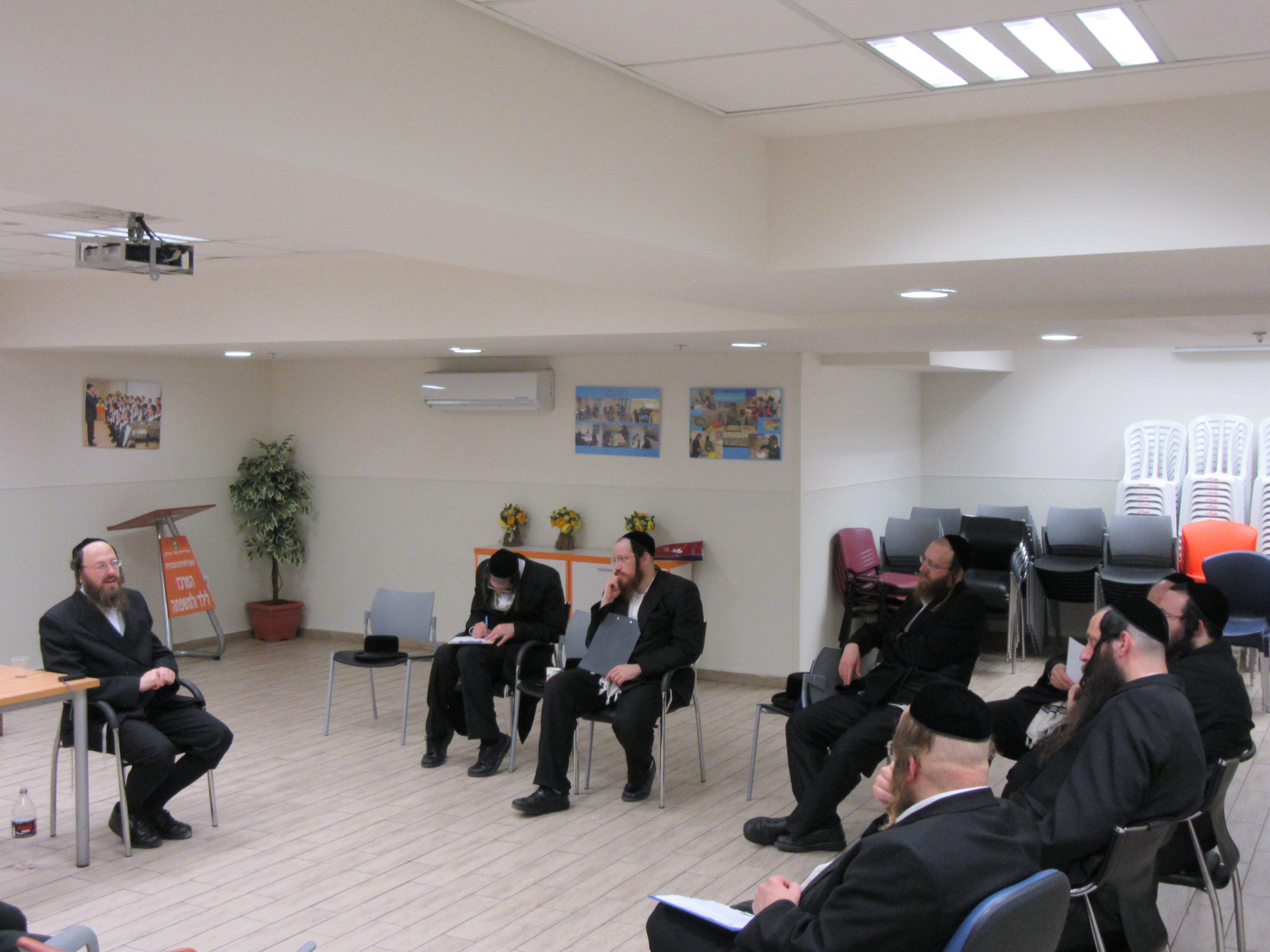Rabbi Yechezkel Shoebacks: "Yeshiva Students Face a Range of Issues, and the Last Place They'll Share Them Is at Home"
For 19 years, Rabbi Shoebacks has met with yeshiva students, knowing them intimately and advising them. He urges parents: "You have no idea what your yeshiva boy is going through," and advises the students: "Share with your parents; it's the best thing you can do."
 Rabbi Yechezkel Shoebacks
Rabbi Yechezkel ShoebacksThe following story was published by Rabbi Yechezkel Shoebacks several months ago. Although it appeared on various platforms, including the Hidabroot site, we are presenting it here again:
"Two weeks ago," he wrote, "as part of my work in yeshivas, I sat with a group of students at a Hasidic yeshiva in Jerusalem. Next to me was the head of the yeshiva, who told the boys about an incident that happened several years ago with a neighborhood resident well-known to them.
This person only had one son, Yossi, who was an older yeshiva student at the time. One morning, the father left the house and discovered to his amazement that his car was not in the driveway. Still stunned by the theft under the moonlight, he thought to go back inside and check another detail, when he discovered that the spare key was also missing.
A troubling thought crossed his mind - could beloved Yossi, who had recently learned to drive, be involved? He called the duty supervisor at the yeshiva to speak with his son. The supervisor couldn't find Yossi in the yeshiva and heard from dormitory friends that Yossi had been absent since midnight.
Within minutes, a search began. The father's heart led him to a winding road not far from home.
He was correct.
His heart sank at the sight of his scattered car remains in the ravine. Yossi, of blessed memory, was resting in eternal peace there.
Within hours, the full story that shocked me like nothing recently was revealed: That morning, Yossi's close friend, Meir, dragged himself out of bed with difficulty and very late.
When the terrible news reached the yeshiva, all eyes turned to Meir, who stood stammering broken words. It was clear to everyone that Meir knew something nobody else did.
In a short hour, a thorough investigation took place, and it turned out that Meir was Yossi's partner in planning the journey and was with him on his final path.
At four o'clock in the morning, it became clear, the car veered off the road and rolled into the ravine. The car suffered severe damage on the driver’s side, but Meir, who was sitting on the right side, managed to escape, climb up the ravine, and reach the road safe and sound.
Out of terrible fear that his dark part in the story would be revealed, Meir returned on foot to the yeshiva, quietly got into bed, and hoped to keep his part in the story hidden forever.
But the official report from the rescue forces told the horrific story of the accident.
It turned out that Yossi was not injured in the head or heart. The only injury was a large wound in his abdomen, and according to medical assessment, it was clear that Yossi, of blessed memory, was still alive for several hours after the accident, during which he could have been saved and kept in the land of the living. Yossi died from blood loss.
More precisely: Yossi died because of Meir's silence, his best friend.
The guys who participated in the workshop knew the first part of the story, of the yeshiva boy from the neighborhood who was killed a few years ago while driving his father's car.
They even knew to add that the father, who had lost his only son, fell seriously ill two years later and died. But they did not know the second part, about Meir's part in the story.
They sat in shock, absorbing the meaning of the story.
Then I broke the heavy silence and asked them a simple question: "What do you think would have caused Meir to call immediately after the accident to his father or the supervisor, to tell the story, and ask for urgent help?"
In other words: What did Meir expect to hear and feel from the authority figure above him, which would cause him not to fear and would make him tell, at that critical moment, what had happened?
I went through thirty boys, one by one, and was astonished to hear the answers. Out of thirty boys, twenty-six answered similarly.
Each in his own way. Each in different words. But the answer was the same, with one sole meaning: "Meir expected not to be punished".
Do you get it?
Fulfilling Meir's minimal expectation - his need for a sense of security, that they would receive his confession, understand him, and not punish him - that is what could have prevented Yossi's death, his father's subsequent illness and death, the deep and inconsolable sorrow of the widow and bereaved mother, and the shocking fact that three people no longer have descendants.
A Parent's Duty to Convey the Message: "I Will Always Love You"
Rabbi Yechezkel Shoebacks, who stands behind the publication of this shocking story, speaks to us with pain and notes that every word of the story is completely true and accurate.
Due to his role as a Rosh Mesivta in a yeshiva, a cheder manager, and a writer of educational articles and stories, he meets yeshiva students often and has a clear conclusion from all these meetings: "I can say with great certainty that sometimes all it takes to give your child confidence is to convey the message: 'Know that whatever happens to you, always feel free to come to me. I promise you that I will never blame you, always understand you and always provide you with all the support in the world.' Because this sense of security can change their life".
In recent years, Rabbi Shoebacks has been moving from yeshiva to yeshiva, sitting with boys in circles, and discussing various topics that were previously unspoken. Among other things, he urges them repeatedly to talk to their parents and share their lives with them.
"Parents do not always realize how much boys keep secrets, guarding them closely," he says, "They return home and try to outwardly signal that everything is fine, when in fact it is not".
According to him, from his firsthand experience, there are a very high percentage — about 90% of boys who do not share anything with their parents. "Sometimes they may tell stories from yeshiva life, but if they have a real difficulty or problem with the staff or with a friend, they usually will not tell their parents, and that's unfortunate".
 Rabbi Shoebacks lecturing to educators
Rabbi Shoebacks lecturing to educatorsAnd maybe they really do not need this connection with their parents? Maybe it will only burden them?
"There are boys who say to me: 'I don't need to talk to my parents, I have a team member I talk to about my difficulties,' or: 'I study with a private avrech and open up to him.' But I tell them it is of little value compared to the relationship with parents because the staff member in the yeshiva or the supervisor or the avrech, are people who likely will not accompany you all your life. What will you do after the wedding - when you encounter financial difficulties or need home peace advice or help with the children?
"The moment you maintain a good relationship with your parents, you will know that it will never stop. It is like a family doctor who knows you since you were a baby till today and knows all your medical history. It is the same with parents. They know you since you were born and are the most appropriate address to come to and share.
"And even much more than that - there is no one who loves you as your parents love you and cares for you. After all, the thing that interests them most in life is for you to always be well".
Do you think parents will always know how to respond correctly?
"The question is indeed on point. Most of the parents I know love their children very much, they also care and want only the best for them. But indeed, they do not always know how to respond as required, so I give the boys a little tip: Before you talk to your parents, say to them, 'Listen, Dad and Mom, I want to tell you something, and I'm very afraid because I'm worried you'll be angry at me or take it hard.' At that moment, the parents' reaction will generally be: 'You should not be afraid, we are here for you.'
If it is their response, it will be easier for him to talk. If not, no one will be able to force him to reveal the secret because in the meantime, the secret is kept with him.
"But from my experience," emphasizes Rabbi Shoebacks, "I can testify that most boys are pleasantly surprised. They initially think that the parents will react harshly, but eventually, the responses are much more understanding than they could have imagined."
And he has something to tell the parents: "It is important for me to emphasize that besides telling the children all the time that we are with them and beside them, it is also necessary to demonstrate it in practice. Because even a parent who tells his child that he is always with him, but when he comes with a bad grade on a test, suddenly gets angry and scolds, then the child will catch the behavior message more than the verbal message. Therefore, our real-time response is critical".
From Social Problems to Spiritual Challenges
You've been constantly talking about 'boys' difficulties.' What do you mean? What difficulties might they have?
"Sadly, I can testify that there is a range of problems. There are boys who have no desire to study and are very embarrassed to tell their parents. Some get into trouble with the staff, or are immersed in social problems. Boys feel very uncomfortable telling parents that they are fighting with peers and that no one wants to be their roommate, or conversely - they are dragged by friends who pull them into bad deeds. Sometimes issues arise with prayers. If we take for example the High Holidays, there are a lot of boys who cannot withstand the long prayers. It is very common among young boys, and how could they tell such a thing to their parents?"
When we ask Rabbi Shoebacks about solutions, he emphasizes: "I do not offer the boys any solutions, not at all. But I sit with them and help them engage in a group discussion on these topics. What usually comes out is that talking is the greatest solution because when there is an internal difficulty and it does not come out, the oppression is much greater. It is not for nothing that King Solomon said, 'Anxiety in a man's heart will weigh it down,' and our sages said about it: 'do not read it weigh it down, but disclose it,' because when a person has a difficult feeling inside he feels 'bursting' and unable to deal with it, but once he talks, he already releases the emotion out and then it becomes like clay and can be worked with."
And what do yeshiva staff members say about your approach?
"Well, naturally, this approach sometimes scares us all a little, because we are used to hiding behind barriers. We are comfortable with it and it is easy to come to the yeshiva without anyone in the world knowing what happened to us. Look, I've put on a suit and hat and hidden everything. But of course, that's not correct because when experiences are had and not unloaded, they may eventually erupt.
"Some staff members rightly claim that conversations like the ones I have with the boys can bring up issues. They also say to me: 'Currently, the situation is calm and everything is fine, if you enter the yeshiva you will see that everyone smiles and is happy, so why start digging?' And I answer them with a parable: It's like a person who found many insects and worms in his backyard. So he ordered a huge truck full of sand and covered everything. Apparently, the yard is clean and the ground smooth and beautiful. It seems everything is fine, but after a week, all the insects and worms are surfacing again. So he orders two more trucks of sand and covers them again, but clearly, this will not help in the long run, only short term.
"I explain to the staff that the problems are already present; it is now up to us to decide whether to cover them and hide or to have the courage to talk about them. Because only when we talk will we be able to help."
Recently, Rabbi Shoebacks also published a special book on the subject. "The publication of this book is very exciting for me because I started writing 19 years ago, and I wrote a lot, more than 500 articles. I distributed them in leaflets for yeshiva students and later in various newspapers, but I never had the courage to release a book. Now it is the first time."

What is the book about?
"The book's name is 'Yotzei Mehalev' (Coming from the Heart) and I think that says it all. The protagonist is a successful and talented boy who comes across as a great guy, and indeed he is, but he has challenges in yeshiva and at home. He tries to show business as usual due to his inability to admit he needs help and wants to talk and share. Readers accompany him through his tough struggles until in the end, everything comes out from the heart. Initially, I targeted the book at boys, but during the story's publication in the 'Hamodia' paper and mostly afterward, I realized parents and educators are very intrigued by the story, also because the book conveys the yeshiva's culture which they do not know and is important to understand what their son experiences, and because they can grasp what is happening with their boy and understand as much as possible how they can contribute and help. So yes, it is definitely for them as well".

